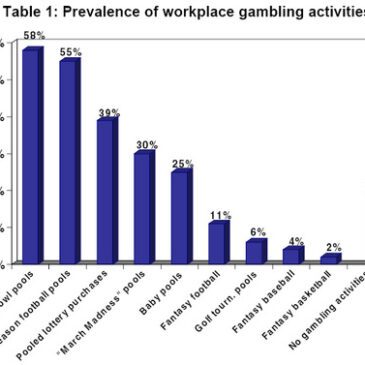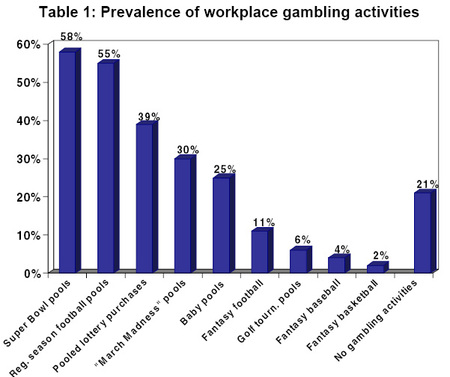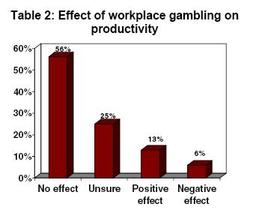Few events bring people together like sporting events do. The Olympics, World Cup, Super Bowl, World Series, NCAA tournament and the Stanley Cup: All have the power to unite fans and to transcend culture, geography, and even politics. As the hype around a particular event grows, excitement pervades nearly all social spaces – the local bar, the bus, the dinner table, and… the workplace.
The Society for Human Resource Management (SHRM) represents over 115,000 human resources professionals and students worldwide. In February 1999, SHRM faxed surveys to 2,300 randomly selected members. Surveys included numerous questions regarding the extent and nature of gambling activities in the workplace in addition to items dealing with management policies. Table 1 summarizes the results gleaned from the responses of 504 (response rate=21.91%) human resources professionals.
Table 2 illustrates the finding that most respondents do not consider workplace gambling to be detrimental to productivity. In fact, 13% consider betting pools and similar activities to be beneficial to productivity.
This benefit may be due to the improvement in morale that can accompany recreational activities in the workplace. That is, "a happy worker is a productive worker." Should workplace gambling be considered in the same category as company picnics, softball leagues, and other job-related recreation? Survey results indicate that there is no consensus among employers. Sixty-three percent of those surveyed replied that their organizations had no set policy to address gambling. And, among organizations that do have policies, consequences for violators are often nonexistent or inconsistent.
There is no research to support or refute the proposition that workplace gambling can lead to problem gambling. Until studies are performed, care should be taken by employers. While employers should monitor and be aware of workplace gambling, they should be careful not to unnecessarily curb possibly healthy behavior. As with many managerial issues, a proper balance between workers’ rights, productivity, and health promotion should be encouraged.






